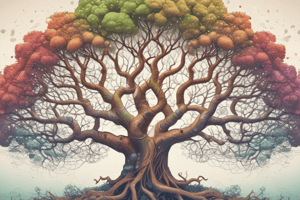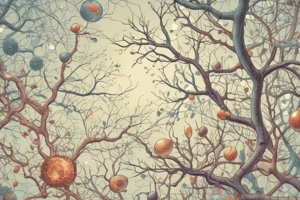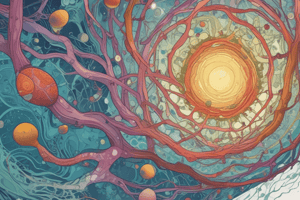Podcast
Questions and Answers
What is the study of the interactions between organisms and their environment?
What is the study of the interactions between organisms and their environment?
- Microbiology
- Genetics
- Ecology (correct)
- Botany
What is the process by which species change over time through natural selection?
What is the process by which species change over time through natural selection?
- Genetics
- Theory of Evolution (correct)
- Taxonomy
- Phylogeny
What is the outermost layer of the cell?
What is the outermost layer of the cell?
- Cytoplasm
- Plasma membrane (correct)
- Mitochondria
- Nucleus
What is the study of the classification of organisms into groups based on shared characteristics?
What is the study of the classification of organisms into groups based on shared characteristics?
What is the process of cell division?
What is the process of cell division?
What is the sequence of organisms that eat other organisms?
What is the sequence of organisms that eat other organisms?
Flashcards are hidden until you start studying
Study Notes
Branches of Biology
- Botany: study of plants
- Zoology: study of animals
- Microbiology: study of microorganisms (bacteria, viruses, etc.)
- Ecology: study of interactions between organisms and their environment
- Genetics: study of heredity and genes
- Biochemistry: study of chemical processes in living organisms
- Molecular Biology: study of biological processes at the molecular level
Cell Biology
- Cell Structure:
- Plasma membrane: outermost layer of the cell
- Cytoplasm: jelly-like substance inside the cell
- Nucleus: controls cell growth and reproduction
- Mitochondria: generates energy for the cell
- Cellular Processes:
- Photosynthesis: conversion of light energy into chemical energy
- Cellular Respiration: generation of energy from glucose
- Mitosis: process of cell division
Evolution and Diversity
- Theory of Evolution: process by which species change over time through natural selection
- Species: group of organisms that can interbreed and produce fertile offspring
- Taxonomy: classification of organisms into groups based on shared characteristics
- Phylogeny: study of evolutionary relationships between organisms
Ecosystems and Ecology
- Ecosystem: community of organisms and their environment
- Energy Flow: transfer of energy from one organism to another
- Food Chain: sequence of organisms that eat other organisms
- Food Web: complex network of food chains
- Ecological Niche: specific role of an organism in an ecosystem
Branches of Biology
- Botany is the study of plants
- Zoology is the study of animals
- Microbiology is the study of microorganisms, including bacteria and viruses
- Ecology is the study of interactions between organisms and their environment
- Genetics is the study of heredity and genes
- Biochemistry is the study of chemical processes in living organisms
- Molecular Biology is the study of biological processes at the molecular level
Cell Biology
- Plasma membrane is the outermost layer of the cell
- Cytoplasm is a jelly-like substance inside the cell
- Nucleus controls cell growth and reproduction
- Mitochondria generates energy for the cell
- Photosynthesis is the process of converting light energy into chemical energy
- Cellular Respiration is the process of generating energy from glucose
- Mitosis is the process of cell division
Evolution and Diversity
- The Theory of Evolution is the process by which species change over time through natural selection
- A species is a group of organisms that can interbreed and produce fertile offspring
- Taxonomy is the classification of organisms into groups based on shared characteristics
- Phylogeny is the study of evolutionary relationships between organisms
Ecosystems and Ecology
- An ecosystem is a community of organisms and their environment
- Energy Flow is the transfer of energy from one organism to another
- A Food Chain is a sequence of organisms that eat other organisms
- A Food Web is a complex network of food chains
- An ecological niche is the specific role of an organism in an ecosystem
Studying That Suits You
Use AI to generate personalized quizzes and flashcards to suit your learning preferences.




